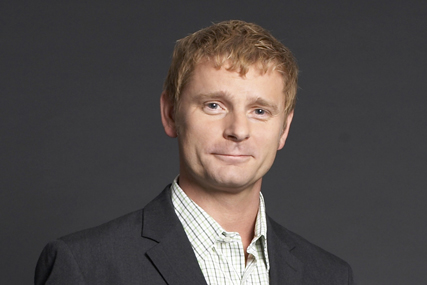Big news swept the world of social media last week: I was ousted as mayor of the Cumberland Pencil Museum, a post I'd held proudly since October. A photograph of my apparent nemesis, Alan, the new mayor, posing with Sven-Goran Eriksson, is on his profile (which is inexplicably irritating in itself).
I feel a sense of lost recognition, but I'll get over it.
I have been using Foursquare, the online check-in service for almost a year now. Via an app on my smartphone, I can let my friends know where I am at any time, earning badges and rewards along the way. The idea is that it will match me up with people I know who are in the area, while at the same time provide an opportunity for bars, restaurants and other businesses to try to solicit my custom and loyalty.
The only trouble is, I struggle to be bothered. Fairly early on, I decided that the only fun I could get out of all this was by using it to tell people when I was at a location in which, I could almost guarantee, there wouldn't be anyone I knew: the Hamptons Art Fair, the summit of Binsey Fell, the Cumberland Pencil Museum.
Perhaps because of this, I haven't received a single offer yet. Not one coffee bar has offered to discount a malochachoccacino, and neither has any restaurant reached out to get me through the door.
Worse, I'm regularly interrupted with notifications that Debbie is at the Ivy, Mark is in Barcelona and Andy is at the Park Hyatt in Goa. So everyone else seems to be at it, too, and coupled with my frustration that they are leading more glamorous lives than me, I'm starting to suffer notification fatigue.
It turns out that I'm not the only one failing to get anything out of mobile social networking. According to a recent study by Pew Research Center, 96% of Americans aren't either.
I'm experiencing notification fatigue from Groupon too. I signed up a few months ago, partly for research purposes, and stayed because I was interested to see what it had to offer. However, despite living in London, a city you'd think was big enough to enable the company to segment its daily offers based on profile, I receive repeated offers for fish pedicures, spa treatments and what I can only describe as intimate decorative procedures.
And yes, when I registered I did inform them that I'm a bloke. Perhaps in some quarters the vajazzle is seen as a gifting item.
Despite all this, my fascination with the web, and social media, remains undimmed, and I will continue to sign up for every new service as I strive to understand the essential mechanisms of the genre. However, if I'm now considering churning some of these, how do normal consumers feel about them?
The key here, as ever, is relevance. Not merely relevance in terms of the relationship I have with the notifier, but the relevance of the notification to my life at that particular moment.
The tendency of every application, from shopping to social, to ping you a heads-up every time the slightest thing happens doesn't support this. I'm notified when my friends change homes, jobs and partners - important stuff that I appreciate knowing about - but I am also alerted when they land at Heathrow, are eating at PizzaExpress or watching Question Time.
Sometimes I'm happy about this, whereas sometimes it interrupts and irritates me. In much the same way that we have learned to deal with the volume of email that threatens to engulf our waking hours, we also have to develop filtering strategies in order to deal with notifications - and services that don't help us to do this will get churned.
Either way, I'm back up to Keswick soon. Watch out Alan, when I get my title back, everyone I know will be notified without delay.
30 SECONDS ON ... PEW RESEARCH CENTER
- The Pew Research Center is a non-partisan 'fact tank' that provides information on issues, attitudes and trends shaping the US and the world. It remains neutral on policy issues.
- The research is divided into seven projects, covering areas such as the internet and US life, excellence in journalism, religion and public life, and social and demographic trends.
- A study it conducted last year found that 22% of adult internet users engaged with the US mid-term political election campaign on Twitter or social networking sites.
- When the Pew group launched in 2004, its president, Andrew Kohut, said: 'It's a new kind of organisation that collects information and disseminates it in an understandable and analytical way, rather than producing expert opinion on policy subjects.'
- A Pew survey last month revealed 82% of those in the US who use social networks, and 85% of Twitter users, are also involved in voluntary groups or organisations.


